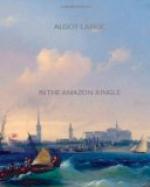I longed for the open; struggled for it, as the swimmer struggles up for air to escape from the insidious sucking of the undertow.
Starving, weak from fever, oppressed by the thought of death, but lashed on by stimulants and the tenacity of life, I headed with my two comrades out of the world of the unknown, toward the world of men—to Life.
CHAPTER VIII
WHAT HAPPENED IN THE FOREST
On the second day of the return trip, we had a remarkable experience. Probably not more than two hundred yards from the tambo where we had spent the night, we heard the noise, as we thought, of a tapir, but nothing could surpass our astonishment when we saw a human being. Who could it be that dared alone to disturb the solitude of the virgin forest, and who went along in these dreary woods humming a melody?
It was a young Indian who approached us cautiously when Jerome spoke in a tongue I did not understand, and evidently told him that we were friends on the way back to our homes by the river. He was an unusually fine specimen of a savage, well built, beautifully proportioned, and with a flawless skin like polished bronze. His clothing was limited to a bark girdle, and a feather head-dress not unlike that worn by some North American Indians.
He was armed with bow and arrows and a blow-gun; and he had a small rubber pouch filled with a brownish substance, the remarkable wourahli poison. He explained to Jerome that his tribe lived in their maloca, or tribal house, about 24 hours’ march from this place, and that he had been chasing a tapir all day, but had lost its track, and was now returning to his home. He pointed in a north-western direction with his blow-gun, signifying thereby the general route he was going to follow in order to reach his destination. We sat down on the ground and looked at each other for quite a while, and thus I had my first chance of studying a blow-gun and the poisoned arrows, outside a museum, and in a place where it was part of a man’s life. At the time I did not know that I was to have a little later a more thorough opportunity of examining this weapon. I asked the Indian, Jerome acting as interpreter, to demonstrate the use of the gun, to which he consented with a grin. We soon heard the chattering of monkeys in the tree-tops, and deftly inserting one of the thin poisoned arrows in the ten-foot tube he pointed the weapon at a swiftly moving body among the branches, and filling his lungs with air, let go. With a slight noise, hardly perceptible, the arrow flew out and pierced the left thigh of a little monkey. Quick as lightning he inserted another arrow and caught one of the other monkeys as it was taking a tremendous leap through the air to a lower branch. The arrow struck this one in the shoulder, but it was a glancing shot and the shaft dropped to the ground. In the meantime the Indian ran after the first monkey and




